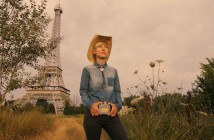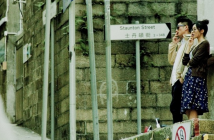This is a dystopia of resignation. Most popular visions of the apocalypse tend towards the spectacular: alien rays decimating New York in Independence Day; huge tidal waves also decimating New York in Deep Impact and The Day After Tomorrow; more destruction befalling New York in Watchmen, both comic and film. What these images of obliteration convey is the magnitude of the apocalypse, its global grandeur. The end of life as we know it as one defiant scream. These spectacles serve as a weird consolation: our extermination requires a wildly expensive show. That is what it will take to wipe us out, an awesome fireworks display.
The Hole contains no such histrionics. Its apocalypse is a droning whimper and its characters are too tired to perform acts of heroism or selflessness. We are not watching the figures of tomorrow’s history books, striking back at the impending extinction of our species. Rather, the protagonists - a man who operates a small store in an otherwise abandoned indoor market and the woman who lives below him in an apartment complex - continue performing the routine tasks of their dull lives despite the horror around them. They have no desire to resist the mysterious plague expanding through Taiwan, along with the perpetual storm raining down without pause.
Both protagonists wander around their apartments as if these were the only geographical areas they could explore. When a hole opens up and joins their respective living rooms, they gain a medium of communication. But most of it is negative: he vomits down on her furniture, she sprays disinfectant up to his face. This accidental aperture offers only the persistent tease of human connection that is never realized, save in fantasy. Meanwhile, the effects of the plague are rarely shown on screen. One victim is carried away by concerned neighbors. Another crawls like a rat in the abandoned market. Eventually, the woman is infected and we watch her powerlessness against the symptoms of the disease. But the real evidence of the apocalypse is in the absence of people, their scarcity in a film of solitary souls perambulating around architectural prisons.
This evokes other celluloid nightmares. In Blade Runner, the saddest images are not those of the overpopulated streets, but rather of the forgotten corners and forsaken neighborhoods of future Los Angeles. Some parts of the city have fallen to oblivion amidst a chaotic society, where the rich fly off to out-world colonies and where the poor rot in an urban wasteland unmonitored by a non-existent government. The ghostly mannequins assembled on the lobby of Sebastian’s building are the symbols of this world gone wrong, plastic stand-ins for the humans who are no longer there. Another, lesser known, science fiction film where the apocalypse is felt through emptiness is Nikos Nikolaidis’ Morning Patrol. In it, a woman walks through a deserted city. The houses remain intact, but their owners are missing, presumably wiped out by a disaster so profound that it cannot even be remembered. Our protagonist searches into her memory, but the amorphous pieces she recovers offer no solution. She watches Hollywood classics on television, echoes of a civilization from a deleted past.
The forlorn pair in The Hole walk through places that need people in order to operate. The apartment complex or the market: their very purpose entails inhabitants, buyers, sellers, small business owners. That we rarely glimpse any of them is the source of great drama. Where are they? Where have they gone? Have they evacuated? Have they died? Every derelict hallway and closed shop inspires hundreds of questions and brings to mind a thousand possible narratives. But these are the interrupted narratives of people who died or escaped a country consumed by death. These untold stories linger over the vacant spaces of The Hole. There are no ruins. There is only a sensation in the air, a remnant of what the plague has wrought.
And then we have dance numbers. Glorious, excessive renditions of old Grace Chang songs. The Hole was made as part of the “2000 Seen By” project, along with other films like The Book of Life by Hal Hartley and The Sanguinaires by Laurent Cantet. Before the credits roll, Tsai Ming-liang signs the following message: “In the year 2000, we are grateful that we still have Grace Chang’s songs to comfort us.” Here is where The Hole allows an outpouring of emotion, in the music and the dancing. While other apocalyptic movies choose the destructive and explosive event as the site of aesthetic flight - as if that were a way of conquering the apocalypse, that is, conquering it by enjoying it - The Hole locates its dashes of visual exuberance in bittersweet musical set pieces that play like imagined alternatives to the despairing real world. Even in these set pieces, the real world does not go away: the apartment complex remains in all its drab oppressiveness. But its meaning is turned around, it becomes the stage for resurrection. When you die in the real world, you are born again in its musical flip-side. If the neglected walls of the apartment complex hide joyless individuals in the former, these same walls build a playful labyrinth of comedy and love in the latter.
Near the end, the hole between the apartments seemingly fulfills its promise and allows the protagonists to embrace, albeit under the guiding voice of Grace Chang. Music as the purveyor of the unlikely; the utopia of a soaring song. Mired in the impossibility of a depopulated wasteland, the characters must dance to counteract the resignation that restrains them to their lots. The battle for life in this apocalypse is not physical, it does not happen in a great war against aliens or the forces of nature; it is emotional and psychological, the fight of individuals against the perils of stasis. Within them churns the romantic melody that sends them, if only in dreams, to another reality. And this reality is not a place, not some faraway Eden. It is exactly where they already are, experienced a different way.
[notification type=”star”]90/100 - The battle for life in this apocalypse is not physical, it does not happen in a great war against aliens or the forces of nature; it is emotional and psychological, the fight of individuals against the perils of stasis.[/notification]




